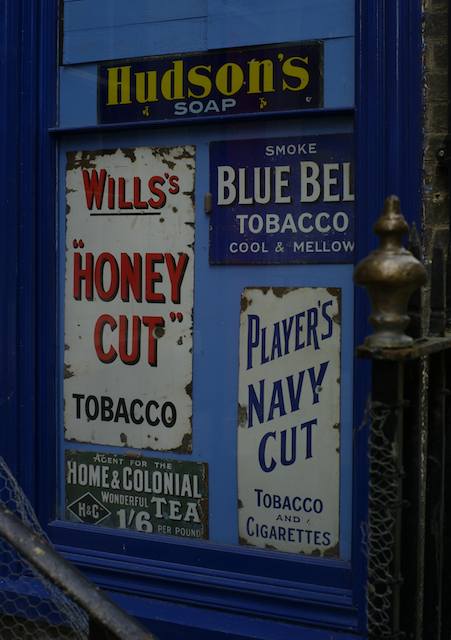Spotted in Cambridge today. Hasn’t changed in — what? — 70 years?
Daily Archives: April 5, 2009
Eye-Fi
Hmmm… If I’d come on this on April 1 I’d have thought it was a good spoof. But it seems to be real.
The Eye-Fi Card stores photos & videos like a traditional memory card, and fits in most cameras. When you turn your camera on within range of a configured Wi-Fi network, it wirelessly transfers your photos & videos. Better yet: you can automatically have them sent to your computer (PC or Mac), or to your favorite photo sharing website – or both!
As far as I can see, the Eye-Fi to Flickr link only works in the US. (It’s a bit like the Amazon Kindle in that respect.) But it still looks like a really neat idea.
Thanks to Rory Cellan-Jones for the original link.
The consolations of ignorance
It’s always agreeable to find idiots talking nonsense. But it’s depressing to find good people doing it. Henry Porter has done great work in defence of liberty in Britain, but he’s written a truly idiotic rant this morning about Google. I was particularly struck by this passage.
One of the chief casualties of the web revolution is the newspaper business, which now finds itself laden with debt (not Google’s fault) and having to give its content free to the search engine in order to survive. Newspapers can of course remove their content but then their own advertising revenues and profiles decline. In effect they are being held captive and tormented by their executioner, who has the gall to insist that the relationship is mutually beneficial. Were newspapers to combine to take on Google they would be almost certainly in breach of competition law.
Then he invokes (who else?) Why, our old friend Thomas Jefferson:
In 1787 Thomas Jefferson wrote: “Were it left to me to decide whether we should have a government without newspapers or newspapers without a government, I should not hesitate to prefer the latter.” A moment’s thought must tell us that he is still right: newspapers are the only means of holding local hospitals, schools, councils and the police to account, and on a national level they are absolutely essential for the good functioning of democracy.
Well, up to a point, Lord Porter. I’m be all in favour of newspapers that perform that noble function. The only problem is that 95% of them haven’t performed it for decades, if ever. Mostly they operated by printing as much crap as could fit between the advertisements. When Craigslist took away the ads they were left with only the crap — for which, oddly enough, customers are reluctant to pay.
The annoying thing about Porter’s piece is that there are really good grounds (e.g. these) for being worried about Google. But they have almost nothing to do with its impact on print newspapers, which would have withered of their own accord because of the way the Internet dissolved their value chains. Google is a monopoly that will present the Obama administration with its first serious anti-trust headache. If they thought that General Motors was too big to fail, just imagine what they will face when the time comes to take on Google.
Beeb haters: be careful about what you wish for. You might just get it
Lovely column by Marina Hyde.
Only this week The Wire’s own Dominic West said that British TV lacked high-end contemporary drama but did costume drama brilliantly – a statement swiftly spun and used as a stick to beat the BBC by the very people who would like nothing more than for most of the corporation’s output to be bonnet- and corset-wrapped. Fortunately, by yesterday morning the mother of all anti-BBC bandwagons was fully operational again, as Ofcom finally handed down its fine to the BBC for the Russell Brand/Jonathan Ross Sachsgate business, allowing Beeb bashers to once more swarm the airwaves and internets to rail against the monstrous licence fee.
Have any of these people seen the likes of Moment of Truth, one wondered idly, in which our hero Mike Darnell hooked up semi-witting participants to lie detectors, whereupon they were asked “Do you really care about starving children in Africa?”, or questioned about their porn-watching habits?
Whether or not it is a fact capable of being grasped by those who wish to destroy the BBC, this is what their telly will look like if and when they succeed. Not necessarily immediately, but give it a couple of years and we’ll be slinging nymphomaniac dwarves on to an island with the worst of them.
The reason we are forced to make do with BBC shows such as Blue Planet or Little Dorrit, or indeed acclaimed programmes on commercial channels, is that rival broadcasters cannot compete with the BBC for funding. They therefore have to compete for quality, an arrangement that in the good times raises standards across the board. In these grim economic times for commercial broadcasters, the licence fee might be the only guarantee that programmes will be made at all…
Great stuff. Every time I have an American guest and they listen to Radio 4 or see BBC4 or 2, they shake their heads in wonderment that such things are still possible. And yet there are lots of folks around in the UK (not to mention in the Daily Mail) who would like to destroy it.
The Wikipedia ‘debate’: time to move on
This morning’s Observer column.
Unwillingness to entertain the notion that Wikipedia might fly is a symptom of what the legal scholar James Boyle calls ‘cultural agoraphobia’ – our prevailing fear of openness. Like all phobias it’s irrational, so is immune to evidence. I’m tired of listening to brain-dead dinner-party complaints about how ‘inaccurate’ Wikipedia is. I’m bored to death by endless accounts of slurs or libels suffered by a few famous individuals at the hands of Wikipedia vandals. And if anyone ever claims again that all the entries in Wikipedia are written by clueless amateurs, I will hit them over the head with a list of experts who curate material in their specialisms. And remind them of Professor Peter Murray-Rust’s comment to a conference in Oxford: “The bit of Wikipedia that I wrote is correct.”
Of course Wikipedia has flaws, of course it has errors: show me something that doesn’t. Of course it suffers from vandalism and nutters who contribute stuff to it. But instead of complaining about errors, academics ought to be in there fixing them. Wikipedia is one of the greatest inventions we have. Isn’t it time we accepted it? Microsoft has.


